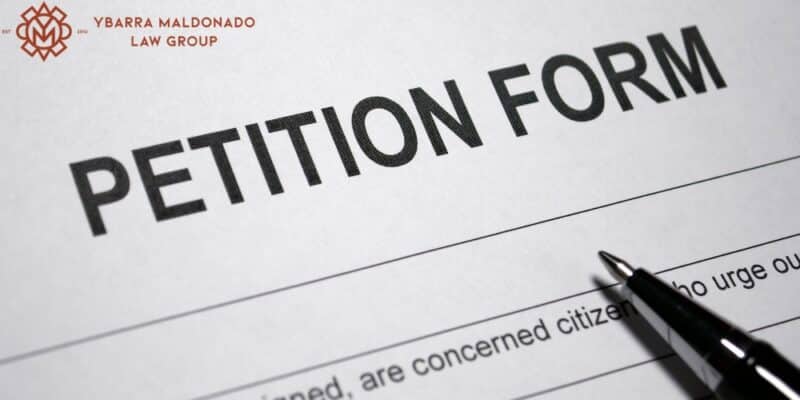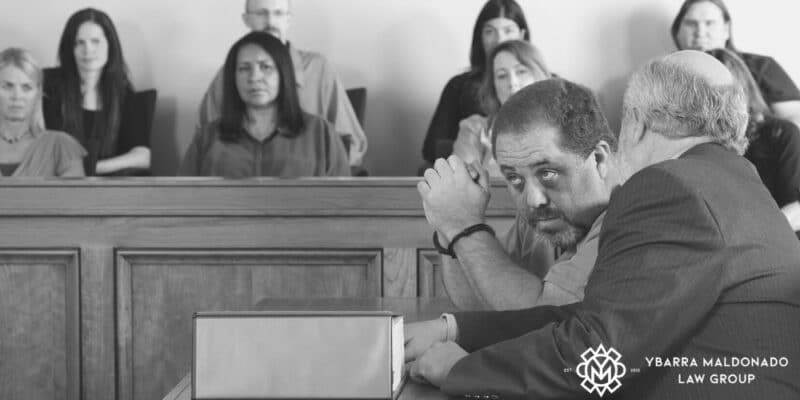POST CONVICTION RELIEF LAWYER PHOENIX
PRACTICE AREAS
DON’T HESITATE TO REACH OUT TO US!
Our Law Firm is committed to becoming the best Law Firm for Latino, migrant, and Spanish speaking communities in Arizona.

Post conviction relief is an option for criminal defendants to have their criminal convictions vacated, their civil rights restored, or their sentences reduced. In other words, this is a legal way in which defendants can obtain relief when they have already been convicted of a crime. If you were wrongfully convicted or sentenced for a crime in Arizona, seeking post conviction relief may be beneficial for you.
At Ybarra Maldonado Law Group, we have extensive experience helping defendants with their post conviction relief petitions. Being wrongfully accused and convicted of a crime of any kind can severely impact your life in a number of ways. You could lose your civil rights, your freedoms, and your personal life could suffer. Let an experienced post conviction relief lawyer advocate on your behalf and give you the tools you need to fight for your rights. To schedule a case evaluation with our Phoenix criminal defense attorneys, please call our office at 602-910-4040 today.
What Is Post Conviction Relief in Arizona?
According to the Arizona court system, a defendant who seeks post conviction relief, “asks the court to vacate or modify a judgment of conviction, or to reduce or modify a sentence.” Basically, you have been convicted of a crime, but you want to obtain some form of relief after the conviction. This relief could be a reduced sentence, a change of your plea agreement, a set aside, or another form of relief.
Regardless of which of the post conviction relief options you seek, the process will be outlined in Rules 32 and 33 of the Arizona Rules of Criminal Procedure. Rule 32 applies to defendants who were “convicted and sentenced after a trial or a contested probation violation hearing.” Rule 33 applies to defendants who “pled guilty or no contest to a criminal offense, who admitted a probation violation, or who had an automatic probation violation based on a plea of guilty or no contest.”
Appeals vs Post Conviction Relief

Post conviction relief proceedings and appeals may sound like the same process, but they are actually separate and distinct processes that apply to different situations. They do have some similarities, however. For example, both a direct appeal and a petition for post conviction relief aim to challenge your sentence or conviction. The end goal in both cases is to get a new sentencing hearing or a new trial.
A direct appeal differs from post conviction relief petitions in that they are only available for those who were convicted after a trial. This means that you did not plead guilty, as there would be no trial if you plead guilty. Post conviction relief is available for those who plead guilty or no contest. Direct appeals are not available for those who plead guilty in their case.
However, post conviction relief can essentially act like a direct appeal for those who do not qualify. Although it is a more limited option, post conviction relief allows defendants to raise certain issues about their trials and guilty pleas. Additionally, post conviction relief allows for the introduction of new evidence, as well as other information that is not included in the court record of your case. Direct appeals, on the other hand, are limited to the evidence and court records from your sentencing hearing, your guilty plea, or your trial. In other words, you cannot introduce new evidence or information.
What Is a Colorable Claim?
This is an important term when it comes to your post conviction review. A “colorable claim” is one that would have changed the course of your case, but only if it is true. Having a colorable claim is crucial for a post conviction investigation. Without one, the appellate court will dismiss your petition. If the court decides that you do have a colorable claim, they will grant you what is called an evidentiary hearing.
Types of Post Conviction Relief Claims

You can raise a number of issues during the post conviction relief process. The full range of what you can do with post conviction relief is outlined in Rules 32 and 33 that we mentioned earlier. Below, we outline some common post conviction relief claims.
Illegal Sentence
Each state’s laws dictate what sentences are legal for certain convictions. If the sentence you received was not legal in terms of either Arizona law or your plea agreement, you can seek post conviction relief.
Ineffective Assistance of Counsel
This is the most common type of post conviction relief claim. Ineffective assistance of counsel claims go against your trial attorney, or the attorney you had during your sentencing, your plea agreement, or even a previous post conviction relief claim. These claims aim to show that the counsel given by your attorney was defective, and that the outcome of your case would have been different if their counsel had been sound.
Law Changes
Sometimes, a criminal defendant can seek post conviction relief after the law changes in some way. However, this is only possible if the new law can be retroactively applied to your case. Basically, it must be able to apply to prior events. If a new law is retroactive, you can seek to overturn your sentence or conviction. One recent example is Prop 207 marijuana expungements.
New Evidence
If you have newly discovered evidence that could have changed your case’s initial outcome, you can use this evidence to seek post conviction relief. Some examples of new evidence include eyewitnesses, DNA, and even mental health diagnoses that were not recognized during the initial sentencing or trial.
How to Request Post Conviction Relief in Arizona
In order to begin the process of post conviction relief in Arizona, we recommend that you speak with an experienced defense attorney. This is crucial, as it can be very difficult and confusing trying to handle this process on your own. You may be required to appear in front of the Arizona Supreme Court, which can be very intimidating.
First, you must file a Notice Requesting Post-Conviction Relief with the trial court that imposed your sentence or judgment. This Notice will include information about you, the defendant, as well as your sentence, conviction, the case’s procedural history, and the grounds for your claim. Once the Notice is filed, you will need to work on your Petition for Post-Conviction Relief.
Post Conviction Relief Petition
The Petition will include more specific information about the grounds for your relief claim, including newly discovered material facts, court records, testimony transcripts, affidavits, and any other relevant information. This Petition must also have a memorandum included that outlines how the facts you present support your relief claim. It should also include supporting legal authorities, if applicable.
Reasons to Seek Post Conviction Relief

Post conviction relief is a wonderful option for a defendant who does not qualify for a direct appeal mandate. However, what other reasons might one have for pursuing post conviction relief in Arizona? Some of the most common reasons why one might begin this criminal procedure include the following.
- New DNA evidence proves your innocence.
- You have evidence of witness tampering or perjury.
- A new law has affected your case.
- Your sentence was either improper or illegal.
- The prosecutor did not release exculpatory evidence, which is evidence that would have absolved your guilt.
- Certain evidence or testimony was admitted to evidence in your trial that should not have been admitted.
- You have discovered other forms of new evidence to support your claim.
- Your legal counsel performed inadequately and did not assist you as they should have.
Deadlines to Petition for Post Conviction Relief in Arizona
It’s important to remember that there are time limits during which you must petition for post conviction relief or be barred from doing so. According to Rules 32 and 33 of Arizona criminal law, the following are the deadlines for filing your Notice Requesting Post Conviction Relief.
- 90 days after sentencing or 30 days after direct appeal mandate: This applies in cases of constitutional violations. Whichever date is later between the two is your final deadline.
- Within a reasonable time after discovering the grounds for your claim: This is vague, but all other claims must be brought within a reasonable time after finding evidence on which to base your claims.
- If you tried to submit your notice on time, but it was late through no fault of your own, you can inform the court of this. They will then decide whether to accept or reject your explanation.
The Petition for Post Conviction Relief is due no later than 60 days after you file the Notice. It is very, very rare to be granted an exception to this deadline. Working with an experienced attorney will ensure that both your Notice and your Petition are filed in a timely manner.
Contact a Post Conviction Relief Attorney in Phoenix Today
If you have been wrongfully accused, illegally sentenced, or if new evidence has come to light about your case, you may be able to seek post conviction relief. The attorneys at Ybarra Maldonado Law Group are here to aggressively fight for your rights and freedoms, while also amplifying your voice throughout the process. To schedule a case evaluation with our attorneys about your case, please call our office at 602-910-4040 today.
TELL US YOUR STORY.
YMLG LEADERSHIP
Our YMLG Directors are Committed to excellence and client care, our team leads with integrity and expertise, ensuring you receive the highest service and support.
DONT WAIT. LET OUR LAW FIRM HELP YOU.

